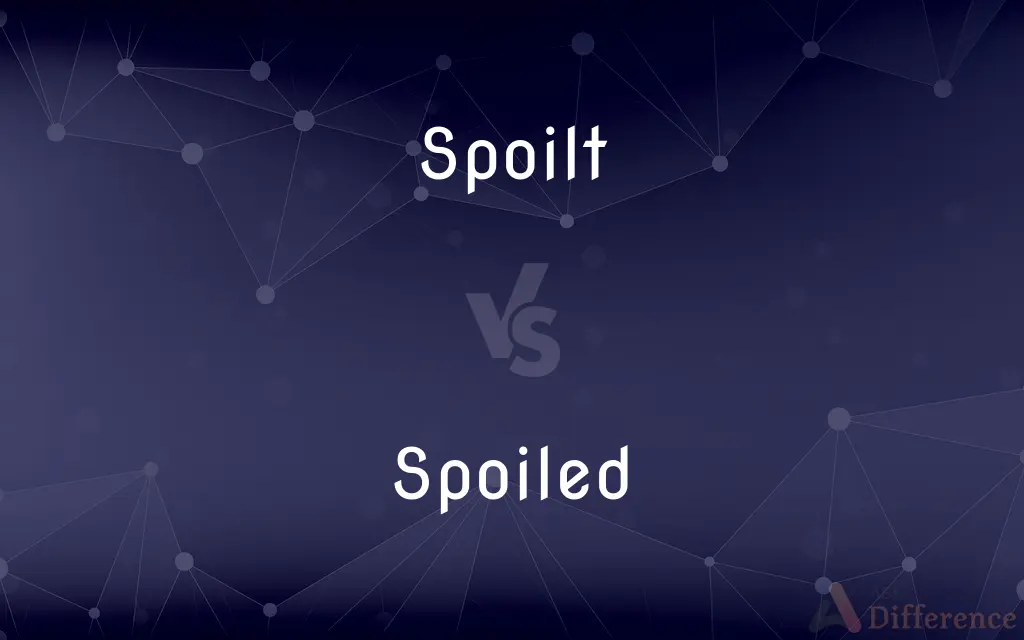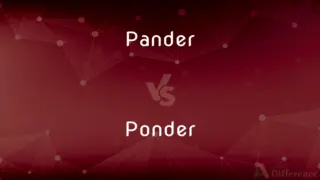Spoilt vs. Spoiled — What's the Difference?
By Tayyaba Rehman — Updated on November 7, 2023
"Spoilt" and "spoiled" both mean to ruin the value or quality of something, but "spoilt" is more common in British English, while "spoiled" is preferred in American English.

Difference Between Spoilt and Spoiled
Table of Contents
ADVERTISEMENT
Key Differences
"Spoilt" is often encountered in British English, functioning as the simple past tense and past participle of "spoil." The word suggests damage to character by overindulgence or excessive pampering. It can be used in contexts ranging from food that has gone bad to a person who has been overindulged.
"Spoiled" is the counterpart used in American English, following the same grammatical rules as "spoilt." It conveys the deterioration or decrease in value or integrity of an item or character. The usage of "spoiled" in the U.S. encompasses all the meanings "spoilt" holds in British English.
When it comes to nuances in connotation, "spoilt" may carry a slightly quaint or old-fashioned tone to American ears, while "spoiled" is straightforwardly modern in the U.S. Despite these connotations, the meanings remain consistent, both implying damage or ruin.
In literature, "spoilt" may appear in dialogue or narration to reflect a character's British background or to give a specific stylistic flavor to the text. On the other hand, "spoiled" would be used similarly in American works to align with the standard language practices in the United States.
While both "spoilt" and "spoiled" are understood globally, the choice between them can be an indicator of the writer's or speaker's cultural and linguistic background. In educational settings, learners are often taught to use the variant of English they are studying, be it British or American.
ADVERTISEMENT
Comparison Chart
Geographic Usage
Common in British English
Preferred in American English
Tense/Form
Past tense and past participle of "spoil"
Past tense and past participle of "spoil"
Connotation
May sound quaint or old-fashioned
Modern and standard usage
Literature Appearance
Reflects British character/style
Aligns with American language practices
Educational Instruction
Taught in British English settings
Taught in American English settings
Compare with Definitions
Spoilt
Ruined in character due to overindulgence
The spoilt child refused to share his toys.
Spoiled
Ruined by too much indulgence
He's spoiled by his grandparents and gets everything he wants.
Spoilt
Having a negative outcome affected by an external factor
The surprise party was spoilt by the early arrival of the guest of honor.
Spoiled
Referring to food that is no longer good to eat
The spoiled fish made the whole fridge stink.
Spoilt
A past tense and a past participle of spoil.
Spoiled
Treated with too much kindness, care, or indulgence
Her puppy is spoiled and expects treats all the time.
Spoilt
(UK) Having lost its original value
Spoiled
Having something desirable ruined
The rain spoiled our picnic plans.
Spoilt
Of food, that has deteriorated to the point of no longer being usable or edible.
Spoiled
(of a person, especially a child) harmed in character by being treated too leniently or indulgently
He acts like a spoiled brat
Spoilt
(of a person, usually a child) Having a selfish or greedy character, especially due to pampering
Spoiled
(of food) having become unfit for eating
The smell of spoiled milk
Spoilt
Simple past tense and past participle of spoil
Spoiled
To impair or destroy the quality or value of; ruin
Spoiled the dish by adding too much salt.
Spoilt
Having the character or disposition harmed by pampering or oversolicitous attention;
A spoiled child
Spoiled
To impair or destroy the enjoyment or experience of
Spoiled the movie by talking throughout it.
Spoilt
(of foodstuffs) not in an edible or usable condition;
Bad meat
A refrigerator full of spoilt food
Spoiled
To reveal details about (a movie or a book, for example) before someone has a chance to discover these details on their own
The article spoiled the next episode of my favorite TV show.
Spoilt
Affected by blight--anything that mars or events growth or prosperity;
A blighted rose
Blighted urtan districts
Spoiled
To harm the character of (a child) by overindulgence or leniency.
Spoilt
Damaged and made unusable
The milk was left out and has spoilt.
Spoiled
To plunder; despoil.
Spoilt
Given excessive treatment, diminishing value
The vacation spoilt us with luxury.
Spoiled
To take by force.
Spoilt
Descriptive of food that has gone bad
The meat is spoilt and smells terrible.
Spoiled
To become unfit for use or consumption, as from decay. Used especially of perishables, such as food.
Spoiled
Goods or property seized from a victim after a conflict, especially after a military victory.
Spoiled
Incidental benefits reaped by a winner, especially political patronage enjoyed by a successful party or candidate.
Spoiled
An object of plunder; prey.
Spoiled
Refuse material removed from an excavation.
Spoiled
(Archaic) The act of plundering; spoliation.
Spoiled
Simple past tense and past participle of spoil
Spoiled
(of food) That has deteriorated to the point of no longer being usable or edible.
Spoiled
(of a person) The state of being heavily pampered
Spoiled
(of a person, usually a child) Having a selfish or greedy character due to pampering.
Spoiled
Treated with excessive indulgence;
Pampered from earliest childhood, he believed the world had been invented for his entertainment
Spoiled
Having the character or disposition harmed by pampering or oversolicitous attention;
A spoiled child
Spoiled
(of foodstuffs) not in an edible or usable condition;
Bad meat
A refrigerator full of spoilt food
Spoiled
Revealing important plot details, as in a story or movie
He spoiled the ending for everyone by talking about it.
Common Curiosities
Which form should I use in academic writing?
Use "spoiled" for American English and "spoilt" for British English, depending on the style guide.
Are "spoilt" and "spoiled" interchangeable?
Yes, they are interchangeable, with "spoilt" more common in British English and "spoiled" in American English.
Can "spoilt" be used in American English?
While it's understood, "spoiled" is the preferred form in American English.
Can "spoilt" refer to spoiled food?
Yes, in British English, "spoilt" can describe food that has gone bad.
Is one form more formal than the other?
No, formality is the same; it's the regional usage that differs.
Is "spoilt" considered incorrect in American English?
It's not incorrect but is less common than "spoiled."
Do "spoilt" and "spoiled" have the same past tense meaning?
Yes, they both serve as the past tense of the verb "spoil."
Can using "spoiled" in the UK be seen as Americanism?
It might be, but it's widely understood due to American influence.
Can both words be used as adjectives?
Yes, both can describe someone or something that has been ruined or overindulged.
Does the choice between "spoilt" and "spoiled" affect the meaning of a sentence?
No, the meaning remains the same; it's just a matter of regional preference.
Are there contexts where one is preferred over the other?
In cultural references or settings, "spoilt" fits British contexts, while "spoiled" suits American ones.
In historical texts, which form is more likely to appear?
"Spoilt" may appear more in older British texts, while "spoiled" could be used in American texts.
How do I know which form to use when speaking?
It depends on the form of English you are using or the region you are in.
Will using "spoilt" in the U.S. confuse people?
It's unlikely to confuse, as many are familiar with both forms due to global media.
Should I correct someone using "spoilt" in the U.S.?
Correction is unnecessary unless it's for consistency in formal writing or educational purposes.
Share Your Discovery

Previous Comparison
Pander vs. Ponder
Next Comparison
Await vs. WaitAuthor Spotlight
Written by
Tayyaba RehmanTayyaba Rehman is a distinguished writer, currently serving as a primary contributor to askdifference.com. As a researcher in semantics and etymology, Tayyaba's passion for the complexity of languages and their distinctions has found a perfect home on the platform. Tayyaba delves into the intricacies of language, distinguishing between commonly confused words and phrases, thereby providing clarity for readers worldwide.















































